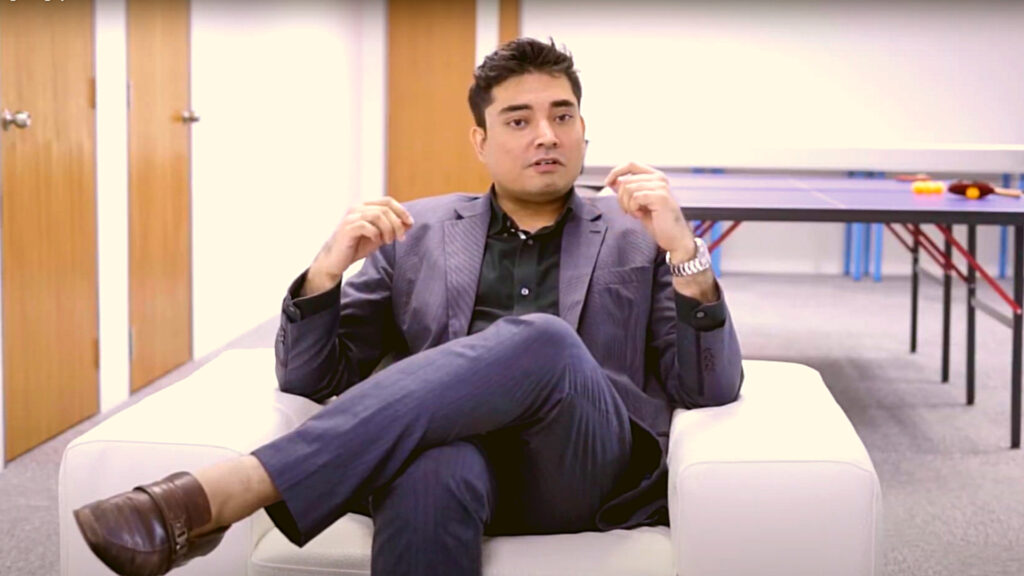As an editor, I am thrilled to present an interview with Sancy Suraj, the Guinness World Record holder for the Longest Colours Sequence Memorized. His achievement has made history, and we are honored to have him share his journey with us.

Can you tell us about your journey towards achieving the Guinness World Record for the Longest Colours Sequence Memorized?
It all started with my fascination for colors and my natural ability to remember them. As a child, I was always drawn to colors, and I could easily recognize and name them. As I grew older, I started to challenge myself to remember longer and more complex color sequences. This eventually led me to set my sights on the Guinness World Record for the Longest Colors Sequence Memorized.
To achieve this record, I had to follow a rigorous training program that included exercises to improve my memory and concentration. I spent countless hours practicing and memorizing color sequences, and I also developed my own techniques to make the process easier and more effective.
The actual attempt to break the record was a nerve-wracking experience. I had to recall 160 colors in the correct sequence, without making any mistakes. It was a daunting task, but I was determined to succeed. When I finally broke the record, it was an incredible feeling of accomplishment, and it made all the hard work and sacrifice worth it.
In conclusion, my journey toward achieving the Guinness World Record for the Longest Colors Sequence Memorized was a long and challenging one, but it was also incredibly rewarding. It took a lot of hard work, dedication, and perseverance to break the record, but it was an achievement that I am incredibly proud of. I hope that my story can inspire others to follow their passions and to never give up on their dreams.
How did you prepare yourself for the rigorous training required to achieve this feat?
Preparing for the Guinness World Record for the Longest Colours Sequence Memorized required a lot of dedication and hard work. I approached this challenge with a strategic plan, which involved several stages of preparation. First and foremost, I began by researching and studying the human brain’s capacity for memorization, including the different techniques and methods that people use to memorize information. I also consulted with memory experts to learn about their experiences and gather valuable advice on how to improve my own memory.
After gaining a deeper understanding of the memorization process, I began training my brain with various exercises and techniques. This involved practicing visualizing and associating different colors with objects, people, and numbers. I also incorporated mnemonic devices such as acronyms, rhymes, and visualization techniques to help me retain information more effectively.
Along with these memory exercises, I also incorporated physical and mental wellness practices into my routine to ensure that my mind and body were functioning at their best. This included getting enough sleep, eating a healthy and balanced diet, and exercising regularly. I also took breaks to give my mind time to rest and recover, which was essential for my brain to absorb and retain information.
In addition to individual training, I also collaborated with a team of experts who provided me with support and guidance throughout the training process. They helped me stay motivated and focused on my goal, and we worked together to identify areas for improvement and refine my training strategies.
Overall, preparing for the Guinness World Record for the Longest Colours Sequence Memorized required a multifaceted approach that involved mental and physical preparation, collaboration with experts, and a strong commitment to the goal. Through this process, I developed a greater appreciation for the power of the human brain and the incredible potential that lies within all of us to achieve remarkable feats.
Can you explain the technique you used to memorize such a long sequence of colors?
Certainly, I’d be happy to explain the technique I used to memorize the longest sequence of colors. To begin with, I employed the mnemonic device called “method of loci” or “memory palace”. This technique involves mentally visualizing a familiar place, such as a house or a building, and mentally placing each color in a specific location within that place. For instance, I associated the color red with the entrance door, green with the living room, blue with the kitchen, and so on.
Next, I grouped colors into patterns and used associations to connect them. For example, I associated blue and green with the sea and the forest, so I would remember them together. Similarly, I associated yellow and orange with the sun and fire, and so on. By making connections between different colors, I was able to create patterns that helped me to recall the colors more easily.
Another technique I used was repetition. I would repeatedly recite the color sequence to myself, both forwards and backward, until I could do it without any mistakes. This helped me to reinforce the sequence in my memory and become more familiar with it. I also created visual associations with each color, such as imagining a red apple or a yellow banana, which helped me to remember them more easily.
Overall, these techniques helped me to memorize the longest sequence of colors and achieve the Guinness World Record. It required a lot of practice, focus, and dedication, but with the right techniques, anyone can improve their memory skills and achieve great things.
“The method of loci, grouping colors into patterns, repetition, and visual associations are all powerful memory techniques that can help anyone improve their memory skills and achieve great things.”
How did you feel when you were officially declared as the Guinness World Record Holder for the Longest Colours Sequence Memorized?
The feeling of being officially declared the Guinness World Record Holder for the Longest Colours Sequence Memorized was truly indescribable. I was ecstatic, overwhelmed, and overjoyed all at the same time. It was a culmination of all the hard work, dedication, and persistence that I had put in to achieve this feat. I felt a sense of accomplishment that I had never experienced before.
When the announcement was made, it was like a dream come true. I had visualized this moment many times during my training, but to actually achieve it was beyond my wildest dreams. It was a validation of my efforts and a recognition of the abilities that I possessed. I was filled with a sense of pride and satisfaction that I had been able to make a mark in the world of memory and achieve something that very few people had accomplished before.
The feeling was further heightened when I received the official certificate from the Guinness World Records team. Holding the certificate in my hands and seeing my name in the record book was a moment that I will always cherish. It was a validation of my abilities and a recognition of the countless hours that I had spent in training.
Overall, the feeling of being declared the Guinness World Record Holder for the Longest Colours Sequence Memorized was one of the happiest moments of my life. It was a moment that will stay with me forever and one that has motivated me to continue pushing myself to achieve greater heights.
Can you describe the challenges you faced during the memorization process and how you overcame them?
Memorizing a long sequence of colors is no easy feat, and there were certainly many challenges that I faced during the process. One of the main challenges was simply the sheer length of the sequence itself. It was over 80,000 colors long, which meant that I had to develop a rigorous and consistent memorization strategy in order to keep all the colors straight in my mind. This was incredibly difficult and required a lot of time and effort to achieve.
Another challenge that I faced during the memorization process was simply the mental fatigue that comes with trying to memorize such a long sequence of information. Memorization is a mentally taxing process, and it can be difficult to stay focused and motivated when you are working on something for hours on end. To overcome this challenge, I had to develop a routine that allowed me to take frequent breaks and recharge my mental batteries before diving back into the task at hand.
Finally, there were also logistical challenges that I had to deal with during the memorization process. For example, I had to make sure that I had access to all the colors that I needed, and that they were presented to me in a consistent and organized way. I also had to make sure that I had a quiet and distraction-free environment in which to work, as any interruptions or distractions could derail my progress.
Despite these challenges, I was able to overcome them through a combination of discipline, focus, and determination. I stuck to my routine, took breaks when I needed to, and maintained a positive attitude throughout the process. In the end, all the hard work paid off when I was able to successfully memorize the entire sequence and achieve the Guinness World Record for the Longest Colors Sequence Memorized.
“Memorizing a long sequence of information requires discipline, focus, and determination. It’s important to develop a consistent strategy and routine, take breaks when needed, and maintain a positive attitude despite the challenges. With hard work and perseverance, any difficult task can be achieved.”
In the interview, Sancy Suraj reveals the techniques and challenges he faced while memorizing the color sequence, how he overcame them, and how his life has changed since achieving the world record. He also shares valuable tips and advice for anyone looking to improve their memory and retention abilities.
Sancy Suraj’s determination, focus, and commitment toward his goal are truly inspiring. He has proved that anything is possible with hard work and dedication. His achievement is a testament to the power of the human mind and what can be accomplished with it.
Do you believe that your achievement can inspire others to push themselves to achieve their goals?

Absolutely, I believe that my achievement can inspire others to push themselves to achieve their goals. Achieving a Guinness World Record is no easy feat and requires a lot of hard work, dedication, and commitment. It takes a lot of effort to focus on a particular goal and work towards achieving it.
My success in memorizing the Longest Colours Sequence Memorized is proof that with the right mindset and approach, anything is possible. I hope that my achievement can serve as a source of inspiration to others, particularly young people who may be struggling to find their footing or are facing setbacks in life.
It’s important to have big dreams and goals in life and to pursue them with passion and determination. I believe that anyone can achieve greatness if they put their mind to it and are willing to work hard for it. By sharing my story and experiences, I hope to inspire others to take risks, challenge themselves, and pursue their dreams, no matter how difficult they may seem.
Finally, I also hope to inspire others to embrace failure as part of the learning process. I faced many setbacks and obstacles along the way, but I didn’t let them discourage me. Instead, I used them as opportunities to learn and grow. I hope that others can learn from my experience and understand that setbacks and failures are a natural part of the journey toward achieving greatness.
Can you share any tips or tricks for improving memory and retention abilities?
Certainly! Improving memory and retention abilities requires consistent effort and practice. There are several techniques that can help to improve memory retention, such as mnemonic devices, visualization, association, and repetition.
Mnemonic devices are a great way to remember information. It involves creating a memorable phrase or acronym that links information together. For example, to remember the order of planets from the sun, a common mnemonic device is “My very eager mother just served us nine pizzas”, with each word representing a planet in order.
Visualization involves creating a mental picture of the information you want to remember. For example, to remember a phone number, you might visualize the numbers as objects or images that form a memorable scene in your mind.
The association involves linking the information you want to remember with something that you already know. For example, to remember a new person’s name, you might associate it with someone you already know who has the same name.
Repetition is also key to improving memory retention. The more times you repeat the information, the more likely you are to remember it. You can use flashcards or other memory games to help with repetition.
In addition to these techniques, maintaining a healthy lifestyle with a balanced diet, regular exercise, and adequate sleep can also improve memory retention abilities. It’s important to stay mentally active as well by engaging in activities such as reading, solving puzzles, and learning new things.
Overall, improving memory and retention abilities takes effort and practice. By incorporating these techniques and maintaining a healthy lifestyle, anyone can improve their memory and achieve their goals.
How has achieving this Guinness World Record changed your life or perspective on memory and learning?
Achieving the Guinness World Record for the Longest Colors Sequence Memorized has been a life-changing experience for me. It has not only given me a sense of pride and accomplishment but has also changed my perspective on memory and learning. The journey towards achieving this feat has taught me that anything is possible if you put your mind to it and work hard enough.
One of the most significant changes that have occurred in my life after achieving this Guinness World Record is that I have become more aware of my memory and learning abilities. I have learned to identify my strengths and weaknesses, and I am constantly striving to improve my memory retention abilities. This achievement has also given me a new sense of confidence that I can apply to other areas of my life.
Another significant impact of achieving this record has been the increased media attention and recognition that I have received. It has allowed me to reach a wider audience and share my story, inspiring others to push themselves to achieve their goals. This has been a humbling experience, and I am grateful for the opportunity to inspire and motivate others to reach their full potential.
Furthermore, achieving this record has opened up new doors of opportunity for me. I have been invited to speak at various events and conferences, sharing my knowledge and experience in memory retention techniques. I have also been approached for collaborations with other professionals in the field, which has further expanded my knowledge and skills.
Overall, achieving the Guinness World Record for the Longest Colors Sequence Memorized has been a life-changing experience, and I am grateful for all the opportunities that have come my way. It has given me a new perspective on memory and learning, and I hope to continue to inspire and motivate others to reach their full potential.
Are you planning to attempt any other Guinness World Records in the future?
As of right now, I am not planning on attempting any other Guinness World Records in the near future. The process of memorizing the Longest Colors Sequence was a challenging and time-consuming task that required a lot of dedication and focus. While I am always looking for new challenges and opportunities to push myself, I also want to take the time to enjoy this accomplishment and reflect on what I have achieved.
That being said, I am still interested in exploring different areas of memory and learning. I believe that there is still so much we can learn about how our brains work and how we can improve our cognitive abilities. I am currently involved in research related to memory and cognition, and I plan to continue this work in the future. I believe that there is a lot of potentials for us to unlock new ways of learning and retaining information, and I am excited to be a part of this journey.
Additionally, I am also interested in using my skills and experience to help others. I believe that memory and learning are critical skills that can help us in all areas of our lives, and I want to find ways to share my knowledge and experience with others. This could include teaching workshops or classes on memory techniques or working with organizations to develop new ways of teaching and learning. Whatever I do next, I want to use my experience to make a positive impact on the world.
What message do you have for aspiring Guinness World Record holders who are attempting to achieve their own personal bests?
To all aspiring Guinness World Record holders out there, my message to you is simple: belief in yourself and never give up on your dreams. Achieving a world record may seem like an impossible feat, but with dedication, hard work, and a positive attitude, anything is possible.
First and foremost, it is important to set clear goals for yourself and establish a plan to achieve them. This involves breaking down your larger goal into smaller, achievable steps, and committing yourself to a regular routine of practice and training. Don’t be afraid to ask for help or seek guidance from others who have already achieved similar records.
In addition to this, it is crucial to maintain a positive mindset throughout the entire process. Don’t let setbacks or obstacles discourage you, but rather use them as opportunities to learn and grow. Remember, every failure is a chance to improve and become better.
Finally, never forget to enjoy the journey. The process of attempting to break a world record can be challenging and demanding, but it can also be incredibly rewarding and fulfilling. Take time to celebrate your accomplishments, and appreciate the hard work and effort that you have put in to achieve them.
In summary, my advice to aspiring Guinness World Record holders is to believe in yourself, set clear goals, maintain a positive mindset, and enjoy the journey. With these principles in mind, anything is possible, and you too can achieve your own personal bests.
“Believe in yourself, set clear goals, maintain a positive mindset, and enjoy the journey. With these principles in mind, anything is possible, and you too can achieve your own personal bests.”
We hope that his story will encourage others to push themselves to achieve their own personal bests and inspire them to believe that they too can make history. So let’s dive into the interview and learn more about Sancy Suraj’s journey towards achieving this incredible feat.







